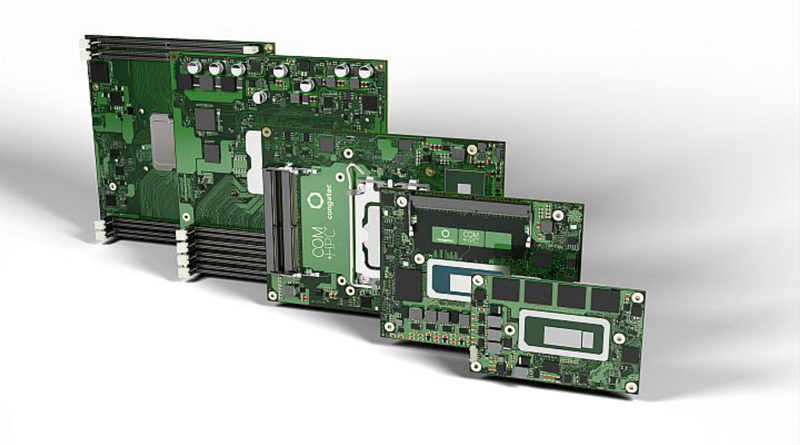Small form factor to complete high-performance ecosystem
congatec will be presenting its comprehensive COM-HPC ecosystem. Together with the accompanying tailored cooling solutions, carrier boards, and design-in services, congatec now provides everything designers need for their next generation of high-end embedded and edge computing platforms. The portfolio now ranges from high-performance COM-HPC Server-on-Modules to ultra-compact and brand-new COM-HPC Client-on-Modules that is hardly larger than a credit card. And with the new COM-HPC Mini standard, even the most space-constrained solutions can now benefit from a high-performance boost and a significantly larger number of new high-speed interfaces. Thus, entire product families can now migrate to the new PICMG standard – without requiring significant modification of the internal system design and housing.
The highlight of the innovations: COM-HPC Mini
The flagship of congatec’s embedded world showcase is the first sample of COM-HPC Mini designs. Launching officially after final PICMG ratification of the new specification, the first high-performance COM-HPC Mini modules will be equipped with the 13th Gen Intel Core processors (codename Raptor Lake), representing the latest benchmark for the high end of embedded and edge computing at the client level.
With congatec’s recently introduced high-performance Computer-on-Modules with 13th Gen Intel Core processors on COM-HPC Client Size A and Size C, developers now have the entire bandwidth of this new processor generation at their disposal on COM HPC. Thanks to state-of-the-art connectivity, the COM-HPC standard opens new horizons for developers of innovative designs regarding data throughput, I/O bandwidth, and performance density that cannot be achieved with COM Express. congatec’s COM Express 3.1 compliant modules with 13th Gen Intel Core processors, on the other hand, primarily help to secure investments in existing OEM designs, for instance, by providing upgrade options for more data throughput thanks to PCIe Gen 4 support.
The COM-HPC Mini form factor predominantly addresses ultra-compact high-performance designs such as DIN rail PCs or rugged handhelds and tablets. However, COM-HPC Mini also solves the Gordian knot that developers of ultra-compact COM Express systems have been facing when wanting to switch to COM-HPC to be able to utilize the latest interface technologies. The previously smallest COM-HPC footprint – COM-HPC Size A – did not allow this: Measuring 95×120 mm (11,400 mm²) is almost 32% larger than the COM Express Compact form factor, which measures 95×95 mm (9,025 mm²). From a footprint standpoint, that’s 25 mm too wide to migrate existing COM Express designs to COM-HPC. Since COM Express Compact is the most widespread COM Express form factor and only the high-end currently still use the even more significant COM Express Basic form factor, many developers faced considerable challenges – if only in terms of system design dimensions. But smaller is always possible. That’s why COM-HPC Mini, with its 95×60 mm, is a real liberator, opening up entirely new high-performance perspectives – particularly for the many ultra-compact system designs.

